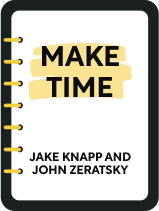

This article is an excerpt from the Shortform book guide to "Make Time" by Jake Knapp and John Zeratsky. Shortform has the world's best summaries and analyses of books you should be reading.
Like this article? Sign up for a free trial here .
Do you wish you had more time for yourself? What’s most important to you in your life?
In Make Time, Jake Knapp and John Jeratsky advise keeping a daily “Focus” to establish a routine and complete focus. Their main goal is to help you make time for what matters, rather than adding more stress to your life.
Read below to learn how to use their tips to make time for what matters most to you.
Implementing the Make Time Strategy
The sheer scope of Knapp and Zeratsky’s recommendations will no doubt seem overwhelming at first. Setting priorities and boundaries, changing your digital habits, and learning to lead a healthier lifestyle are each, on their own, monumental tasks. Thankfully, you shouldn’t expect to tackle any or all of it at once.
The author’s tips and suggestions are merely that. By trying what works and what doesn’t for you, you can incrementally rearrange your life in a way that will be transformative over time. By doing this, you’ll be able to make time for what matters to you.
To begin, you might only pick one recommendation to follow from each of the three big categories: selecting your Focus, protecting your Focus, and taking care of yourself. Keep doing the ones that work; forget the ones that don’t. Since the last thing you want is to add to your to-do list, the best tips to employ are the ones that fit into your life with the least amount of hassle.
(Shortform note: Many authors tout how small, incremental changes have a snowball effect over time. In Small Move, Big Change, Wall Street executive Caroline Arnold espouses the idea of “microresolutions” to make personal change achievable. In Tiny Habits, behavioral scientist B.J. Fogg lays out steps to identify the smallest version of a change you want to make, to make it easy and actionable.)
The key is to set realistic expectations for yourself, try out some of the authors’ suggestions, and look back every day on what worked and what didn’t. While beginning the process of gradual change, the authors recommend keeping a daily log of your progress. Record whether you completed your Focus, which tactics you employed, and how you might tweak them to your advantage. Also be sure to write down moments you enjoyed, and how you might be able to repeat them.
Instead of being a chore, taking notes makes you more aware of how you’re spending your energy and attention. Knapp and Zeratsky insist that keeping a log doesn’t need to be a permanent to-do item, but it does keep you mindful that making small changes has a snowball effect that will let you claim more and more control of your time. (Shortform note: In addition to keeping you focused on your progress, journaling has been shown to have many other benefits. Journaling can help you cope with emotional stress, attain personal goals, and even improve physical health.)
Above all, remember that “Perfect is the enemy of good.” Any process of self-improvement will inevitably run over bumps in the road, and the industry of technological distraction continues to sharpen its tools. Don’t expect every day to go as planned, and don’t expect that you won’t indulge in old habits now and then.
(Shortform note: In The Gifts of Imperfection, Brené Brown argues that the true purpose of perfectionism is to control other people’s perceptions and avoid being shamed or judged. Because it’s rooted in unrealistic expectations, perfectionism causes more painful thoughts and feelings than it could ever prevent.)
In conclusion, Knapp and Zeratsky’s goal isn’t to help you be more efficient or productive, or to add more chores to your to-do list. Their purpose is to help you make more time for what matters. The more you’re able to do that for yourself, the more paths will open, and whatever you’ve dreamed of “someday making time for” may come within reach sooner than you expect.
(Shortform note: In First Things First, Stephen Covey follows up his advice to focus on what’s significant rather than pressing by tying your daily schedule to what gives your life meaning. In Find Your Why, Simon Sinek places finding your purpose as the central motivator that helps you avoid distraction and brings you fulfillment. Lastly, in Grit, author Angela Duckworth affirms that those whose daily work is filled with purpose are more satisfied and happy with their lives overall.)

———End of Preview———
Like what you just read? Read the rest of the world's best book summary and analysis of Jake Knapp and John Zeratsky's "Make Time" at Shortform .
Here's what you'll find in our full Make Time summary :
- How the current landscape is designed to steal your time and attention
- How to be proactive to take back your time
- Why we were all better off as hunter-gatherers






